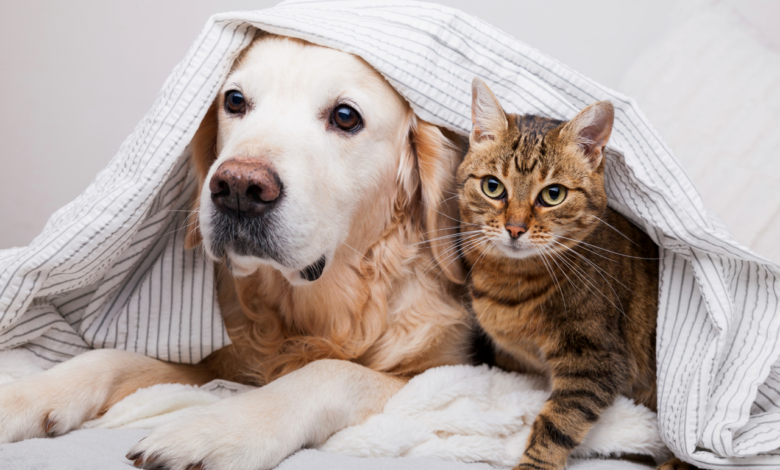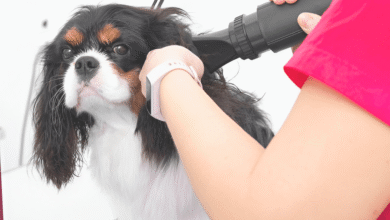
Winter Pet Care Tips 2023
Winter is a magical time of year, but it can also bring harsh weather conditions that pose challenges for our beloved pets. As responsible pet owners, it’s our duty to ensure our furry companions stay safe, warm, and healthy during the colder months. In this comprehensive guide, we’ll provide you with essential winter pet care tips to help you and your four-legged friends navigate the frosty season with ease.
Read More: Fall Pet Care Tips 2023
Preparing Your Home for Winter

Insulating Your Pet’s Living Space
Before the temperature drops significantly, it’s crucial to assess your pet’s living area. Ensure that there are no drafts and that windows and doors are sealed tightly. This will help maintain a comfortable temperature indoors.
Choosing the Right Bedding
Invest in warm and comfortable bedding for your pet’s resting place. Look for materials that are insulating and cozy, such as fleece or faux fur. Elevated beds can also help keep your pet away from cold floors.
Creating a Cozy Corner
Designate a warm and quiet corner in your home where your pet can retreat during cold spells. Provide blankets and pillows to make it extra inviting.
Protecting Your Pet from the Cold
Appropriate Winter Attire
For dogs and cats, especially those with short fur, consider using pet sweaters or coats to keep them warm during outdoor walks.
Limiting Outdoor Exposure
While it’s important for your pet to get exercise, limit outdoor exposure during extreme cold. Shorten walk times and pay attention to signs of discomfort.
Paw Care
Salt and ice can be harsh on your pet’s paws. Consider using pet-safe paw wax or boots to protect them during walks.
Maintaining a Nutritious Diet

Adjusting Food Portions
Pets tend to be less active during the winter months. Adjust their food portions accordingly to prevent weight gain.
Providing Fresh Water
Ensure that your pet has access to clean, unfrozen water at all times. Dehydration can occur even in cold weather.
Supplements for Joint Health
Talk to your veterinarian about joint supplements, especially if your pet has arthritis. Cold weather can exacerbate joint pain.
Regular Exercise and Mental Stimulation
Indoor Playtime
Engage your pet in interactive indoor games to keep them physically and mentally active. Puzzle toys and treat-dispensing toys are excellent options.
Socialization
Don’t let the winter weather deter you from socializing with your pet. Arrange playdates or visits to indoor pet-friendly spaces.
Grooming and Skin Care
Bathing Frequency
Reduce the frequency of baths during the winter to prevent your pet’s skin from drying out. Use a gentle, moisturizing shampoo when necessary.
Moisturizing Paw Pads
Apply a pet-safe paw balm to keep your pet’s paw pads soft and protected from the elements.
Checking for Dry Skin
Regularly inspect your pet’s skin for signs of dryness or irritation. Consult your vet if you notice any issues.
Vet Visits and Vaccinations

Winter Check-Up
Schedule a winter check-up with your veterinarian to address any specific cold-weather concerns. Ensure your pet’s vaccinations are up-to-date.
Flea and Tick Prevention
Continue flea and tick prevention throughout the winter, as these pests can still pose a threat.
Safety Tips for Winter Walks
Shorter Walks
Opt for shorter, more frequent walks rather than long outings in freezing temperatures.
Antifreeze Awareness
Be vigilant about potential antifreeze spills, as it’s highly toxic to pets. Clean up any spills immediately.
Reflective Gear
When walking your pet in the dark, use reflective gear to enhance visibility and safety.
Creating a Warm Retreat
Space Heater Safety
If you use space heaters, ensure they are placed safely out of your pet’s reach to prevent burns or accidents.
Providing Blankets
Keep your pet warm indoors by providing cozy blankets for them to snuggle in.
Designing a Cozy Nook
Consider setting up a designated cozy nook with a warm blanket and their favorite toys.
Monitoring for Signs of Cold Stress
Shivering and Whining
Watch for signs of cold stress, such as shivering or excessive whining. These indicate that your pet may be too cold.
Frostbite and Hypothermia
Learn the symptoms of frostbite and hypothermia and know when to seek immediate veterinary care.
Behavioral Changes
Pay attention to changes in your pet’s behavior, as cold weather can affect their mood and energy levels.
Emergency Preparedness

Creating a Pet Emergency Kit
Prepare an emergency kit for your pet, including food, medications, and essential supplies in case of extreme weather conditions.
Knowing Emergency Contacts
Have a list of emergency contacts, including your veterinarian and local animal shelters, readily available.
Evacuation Plans
Plan for pet-friendly accommodations in case you need to evacuate your home due to severe weather.
Conclusion
Winter pet care is all about ensuring the well-being of your furry friends in challenging weather conditions. By following these winter pet care tips, you can make the season enjoyable and safe for your beloved companions.
Read More: Fall Safety Tips For Your Pets
FAQs
- Should I bathe my pet during the winter months? It’s best to reduce the frequency of baths during winter to prevent dry skin. Only bathe when necessary, using a moisturizing shampoo.
- What signs indicate that my pet is too cold during outdoor activities? Watch for shivering, whining, or a reluctance to continue the activity. These are signs that your pet may be too cold and should head indoors.
- Can I use human winter coats on my pets? It’s better to use specially designed pet sweaters or coats, as they provide the right fit and insulation for your furry friend.
- How often should I check my pet’s paw pads for dryness? Regularly inspect your pet’s paw pads, especially after walks, and apply a pet-safe paw balm as needed to prevent dryness and cracking.
- Is it necessary to keep my pet on flea and tick prevention during winter? Yes, it’s essential to continue flea and tick prevention year-round, as these pests can still be active during the winter months.
Remember, your pet’s comfort and safety are paramount during the winter season. By following these guidelines and being attentive to their needs, you can ensure a happy and healthy winter for your furry family member.







